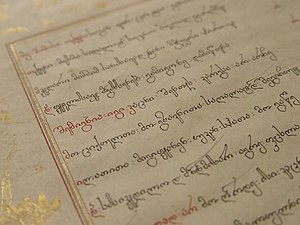The Knight in the Panther's Skin
|
ვეფხისტყაოსანი Vepkhistqaosani The Knight in the Panther's Skin |
|
|---|---|

17th-century manuscript of Vepkhistqaosani
|
|
| Author(s) | Shota Rustaveli |
| Dedicated to | Queen Tamar of Georgia |
| Language | Georgian |
| Date | c. 1180–1205/07 |
| First printed edition | by King Vakhtang VI in 1712 |
| Genre | epic poetry, national epic |
| Length | 6,500 lines |
| Subject | love, friendship, heroism, loyalty |
| Period covered | Reign of Queen Tamar of Georgia Georgian Golden Age |
The Knight in the Panther's Skin (Georgian: ვეფხისტყაოსანი pronounced [vɛpʰxist’q’ɑosɑni] literally "one with a skin of a tiger") is a Georgian medieval epic poem, written in the 12th century by Georgia's national poet Shota Rustaveli. A definitive work of the Georgian Golden Age, the poem consists of over 1600 Rustavelian Quatrains and is considered to be a "masterpiece of the Georgian literature". Until the early 20th century, a copy of this poem was part of the dowry of any bride.
Taking place in the fictional settings of exotic "India" and "Arabia", the poem is a colorful allegory of the rule of Queen Tamar of Georgia, and the size and glory of the Kingdom of Georgia in its Golden Age. It tells the friendship of two heroes, Avtandil and Tariel, and their quest to find the object of love, Nestan-Darejan, an allegorical embodiment of Queen Tamar. These idealized heroes and devoted friends are united by courtly love, generosity, sincerity, dedication, and proclaim equality between men and women, which is a recurring theme. The poem is regarded as the "coronation of thought, poetic and philosophical art of medieval Georgia", a complex work with rich and transcending genres. It has been described as "epic", "chivalric romance", "epic romance" and "epic poem of lyric poetry." Despite its formal complexity, it bears to this day "the Georgian vision of the world."
The creation of the poem corresponds to the Golden Age of the Kingdom of Georgia and the reign of Queen Tamar who was enthroned by her father King George III of Georgia. Tamar was celebrated by poets for her beauty, intelligence and diplomatic skills. She magnified the Georgian kingdom to its historical maximum extension, repulsed the invasions and established protectorates over many Muslim and Christian lands around. Under her reign, the economy prospered and the Georgian caravans reached Ayyubid Egypt, the Kievan Rus and the Byzantine Empire. Medieval science grew and the largest monasteries and churches in Georgia were built, secular literature developed to the point of equaling the greatest religious texts. It was with the backdrop of this "remarkable growth" that Shota Rustaveli composed his poem. Rustaveli, a Meskhetian from the south-western Georgian town of Rustavi, was close to Queen Tamar and possibly served as her treasurer. He likely participated in many military campaigns and the stories in his poem are set in faraway lands, but allegorical representations of his contemporaneous Georgia are recognizable in his work by many things, such as references to wine culture and a female king who became an heir of her father.
...
Wikipedia
